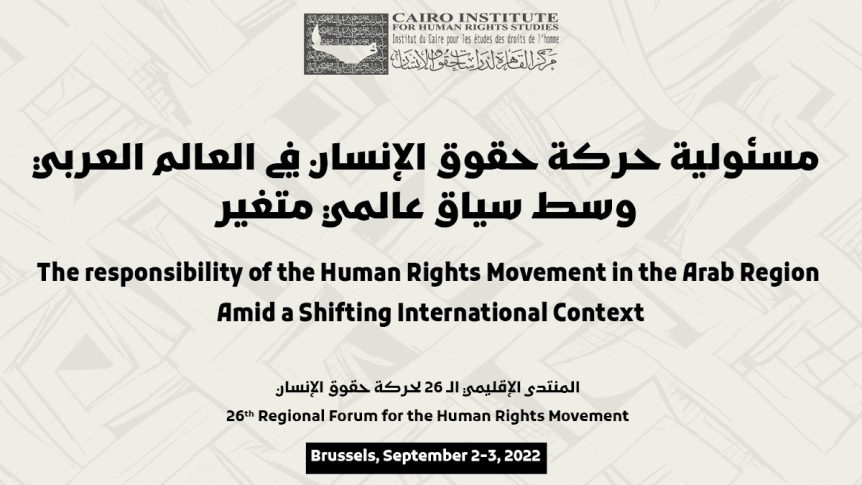On 2-3 September 2022, the Cairo Institute for Human Rights Studies (CIHRS) convened its 26th Regional Forum for the Human Rights Movement in Brussels, Belgium. Fifty human rights defenders and academics participated in the forum, coming from nine Arab states (Algeria, Egypt, Lebanon, Libya, Morocco, Palestine, Syria, Sudan, Tunisia), the United States, and Europe.
The situations in Algeria, Sudan, and Tunisia were addressed by the Forum’s papers, drafted by academic and non-academic experts, while discussions also covered other states in the region. The opening session highlighted the most prominent features of the current international and regional contexts and their implications on the region’s states.
This year’s Forum focused on issues related to the prevailing political culture in the region, and the role of these issues in providing political and moral support to authoritarian regimes and coups in several Arab states. The Forum’s discussions shed light on the responsibility of political elites, civil society organizations, and human rights organizations to address the negative aspects of this culture.
Participants partook in evaluating the role of the human rights movement, civil society, and political and social movements during the two waves of the Arab Spring, to identify where they failed and the internal challenges that hindered them from upholding their responsibilities. This was, however, done while acknowledging that the authoritarian regimes of the region bear the primary responsibility for the failure of democratic transformation.
The regression and failure of the two waves of the Arab Spring revealed the magnitude of the challenges facing the region’s human rights movement. The events of the past decade highlighted the need for the human rights movement to self-reflect, learn from mistakes, and chart a course that would enable it to utilize potential democratic openings.
Main conclusions of the Forum:
Firstly, the values of democracy and human rights are not highly regarded by opposition political elites in the region (including Islamists, liberals, leftists, and Arab nationalists). The elites’ positions on democracy and human rights, and their willingness to sacrifice those values in favor of other ideological and political considerations, played a vital role in aiding authoritarian regimes in several Arab states to repress and contain the two waves of the Arab Spring, and reclaim control. This position on human rights and democracy was not solely held by political movements; it was also shared by some civil society and human rights organizations. Examples include organizations that gave political and moral support to war criminals like Syrian President Bashar al-Assad, who is responsible for using chemical weapons on Syrians, and for killing, torturing, and forcibly disappearing hundreds of thousands while displacing millions of others. There are also organizations that provided moral and political support to coups and authoritarian regimes in several Arab states, and gave cover to large-scale human rights abuses, due to those organizations’ ideological positions on Islamist movements and/or the West.
Secondly, considering the decisive sidelining of human rights values by some civil society and human rights organizations in favor of political and ideological considerations, human rights organizations of the region, especially those concerned with human rights education and dissemination, need to revise their curricula and training programs. They need to pay special attention to formulating training programs that tangibly and creatively address the region’s prevailing political and religious culture. Focusing on rigid indoctrination of human rights values and its technical aspects without addressing the challenges of the political and cultural context in the region is a waste of precious human and financial resources that undermines the goals of human rights education.
Thirdly, although the fragile democratic transitions of the Arab Spring were influenced by factors and variables unique to each case, several states shared similar challenges and regressions, as demonstrated by the following:
- In some Arab states, political and social protest movements overestimated their strengths while downplaying the strengths of their adversaries (the deep state, the military institution, political opposition to democratic transformation).
- Political and social protest movements in some Arab states did not develop organized and structured political platforms that possess leadership or public political programs. This hindered coordination with opposition parties that shared similar objectives, and obstructed the opening of dialogues with reformist elements of ruling regimes, which ultimately contributed to the regression of democratic transformations in those states.
- In other cases, political opposition was unable to transform its slogans and legitimate social and political demands to actionable political programs that rise to the aspirations of the public and political elites.
- Protest movements in some Arab states lacked political imagination, and therefore did not possess the ability to anticipate potential political and security reactions during crucial moments.
- The dogmatic insistence of some components of the region’s human rights movement to reduce their mission to merely a technical one, led them to dismiss their political responsibility to act as a locomotive for prioritizing human rights during dialogues and negotiations between primary political actors.
Fourthly, the management of human rights organizations should regularly review their organizations’ major decisions to ensure that human rights values are the decisive factor behind those decisions, and not political, ideological, social, cultural, or religious considerations.
Fifthly, the Arab Spring is a historical juncture in the struggle for modernity, democracy, and human rights in the Arab region. In some states, the outcomes of the Arab Spring further confirmed the indivisibility of democracy and human rights; one cannot exist without the other. Human rights organizations in each Arab state should (individually or collectively) initiate a review process of its major decisions during the two waves of the Arab Spring. They should examine how those decisions positively or negatively affected their societies, influenced political elites, the prospects of democratic transition, and human rights globally, as well as the evolution of their respective organizations.
Share this Post

